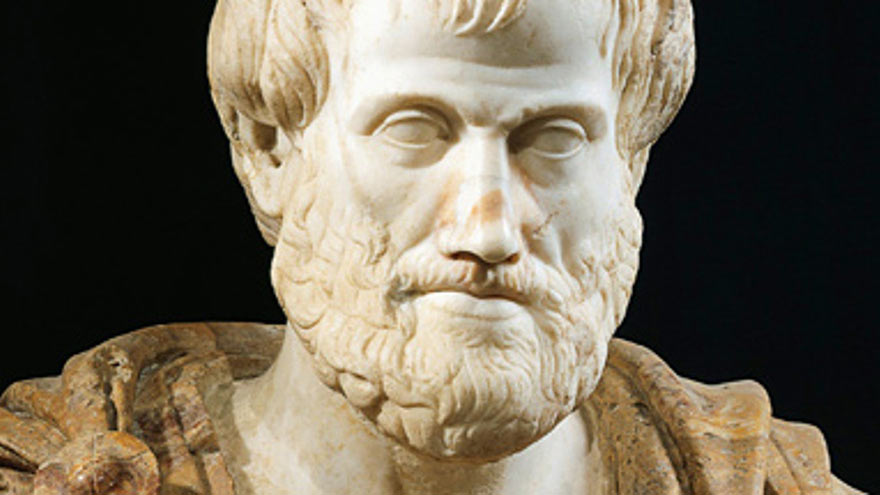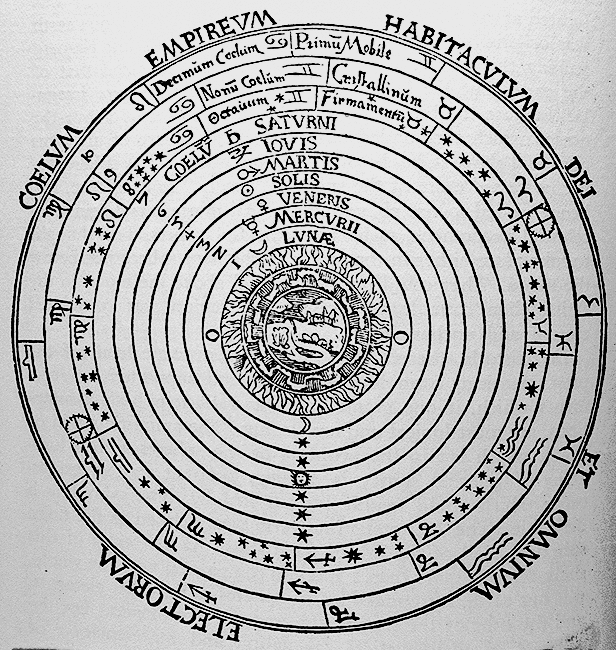
Aristotle, the pupil of Plato, is considered one of the best minds the world has every produced. I'm afraid is just wasn't so, but ask anyone before 1600 who was the smartest man to ever live, and Aristotle would be the only answer you heard. He was seriously challenged by only two men, Diogenes who attended Plato and Aristotle's talks and made fun of them, and in 1536 by Peter Rami (Petrus Ramus in the Latinized form) in his Master's thesis Quaecumque ab Aristotele dicta essent, commentitia esse (Everything that Aristotle has said is false).
Aristotle was a good writer. I think that's why he's famous. His ideas are to our ears silly, but they were believable if you didn't look at nature so closely that you saw the flaws in Aristotle's statements of now Nature operates.
Around 300 B.C Aristotle wrote Meteorology, where the ideas of alchemy are presented. Again, Aristotle is not an alchemist, but alchemy would be constructed on his ideas.
We have already laid down that there is one principle which makes up the nature of the bodies that move in a circle, and besides this four bodies owing their existence to the four principles [elements], the motion of these latter bodies being of two kinds: either from the centre or to the centre. These four bodies are fire, air, water, earth. Fire occupies the highest place among them all, earth the lowest, and two elements correspond to these in their relation to one another, air being nearest to fire, water to earth. The whole world surrounding the earth [water, air, fire, cosmos], then, the affections of which are our subject, is made up of these bodies. This world necessarily has a certain continuity with the upper motions [the movements of the planets are influencing us]; consequently all its power is derived from them. (For the originating principle of all motion must be deemed the first cause. Besides, that element is eternal and its motion has no limit in space, but is always complete; whereas all these other bodies have separate regions which limit one another.) So we must treat fire and earth and the elements like them as the material causes of the events in this world (meaning by material what is subject and is affected), but must assign causality in the sense of the originating principle of motion to the power of the eternally moving bodies . . . Fire, air, water, earth, we assert, come-to-be from one another, and each of them exists potentially in each, as all things do that can be resolved into a common and ultimate substrate. [Bk. 1, 339a 11–339b 2]
So at the centre and round it [the earth-centred world] we get earth and water, the heaviest and coldest elements, by themselves; round them and contiguous with them, air and what we commonly call fire. It is not really fire, for fire is an excess of heat and a sort of ebullition; but in reality, of what we call air, the part surrounding the earth is moist and warm, because it contains both vapour and a dry exhalation from the earth. But the next part, above that, is warm and dry. For vapour is naturally moist and cold, exhalation warm and dry; and vapour is potentially like water, exhalation potentially like fire. [Bk. 1, 340b 19–28]
From the translation of the Meteorology by E. W. Webster, in The Complete Works of Aristotle, Revised Oxford Translation, ed. Jonathan Barnes, Bollingen Series 71.2, vol. 1 (Princeton: Princeton University Press, 1984)
We have a few ideas here. The cosmos, circling as it does by way of it's natural motion to go in circles, is influencing everything below, in our sublunary sphere. We also have the formation of metals in the two vapors that exist below ground, the moist vapors and the dry ones. Keep in mind that Aristotle was from Greece, a geologically active area, and would have been familiar with volcanos.
He continues with an important idea, that by exposing a lesser metal, like copper, to wet or dry vapors, the nature of the metal is changed; it becomes a different metal. Aristotle has adopted the Platonic transmutation, and has defined how it is done: by altering the metal's properties.
We recognize two kinds of exhalation, one moist, the other dry. The former is called vapour: for the other there is no general name but we must call it a sort of smoke, applying to the whole of it a word that is proper to one of its forms. The moist cannot exist without the dry nor the dry without the moist: whenever we speak of either we mean that it predominates. Now when the sun in its circular course approaches, it draws up by its heat the moist evaporation: when it recedes the cold makes the vapour that had been raised condense back into water which falls and is distributed over the earth. (This explains why there is more rain in winter and more by night than by day: though the fact is not recognized because rain by night is more apt to escape observation than by day.) But there is a great quantity of fire and heat in the earth, and the sun not only draws up the moisture that lies on the surface of it, but warms and dries the earth itself. Consequently, since there are two kinds of exhalation, as we have said, one like vapour, the other like smoke, both of them are necessarily generated. That in which moisture predominates is the source of rain, as we explained before, while the dry one is the source and substance of all winds. [Bk. 2, 359b 29–360a 13]
Some account has now been given of the effects of the exhalation above the surface of the earth; we must go on to describe its operations below, when it is shut up in the parts of the earth.
Its own twofold nature gives rise here to two varieties of bodies, just as it does in the upper region. We maintain that there are two exhalations, one vaporous the other smoky, and there correspond two kinds of bodies that originate in the earth, things quarried and things mined. The heat of the dry exhalation is the cause of all things quarried. Such are the kinds of stones that cannot be melted, and realgar, and ochre, and ruddle, and sulphur, and the other things of that kind, most things quarried being either coloured lye or, like cinnabar, a stone compounded of it. The vaporous exhalation is the cause of all things mined – things which are either fusible or malleable such as iron, copper, gold. All these originate from the imprisonment of the vaporous exhalation in the earth, and especially in stones. Their dryness compresses it, and it congeals just as dew or hoar-frost does when it has been separated off, though in the present case the metals are generated before that separation occurs. Hence, they are water in a sense, and in a sense not. Their matter was that which might have become water, but it can no longer do so; nor are they, like savours, due to a qualitative change in actual water. Copper and gold are not formed like that, but in every case the evaporation congealed before water was formed. Hence, they all (except gold) are affected by fire, and they possess an admixture of earth; for they still contain the dry exhalation.
This is the general theory of all these bodies, but we must take up each kind of them and discuss it separately. [Bk. 3, 378a 14–378b 6]
We have explained that the causes of the elements are four, and that their combinations determine the number of the elements to be four.
Two of the causes, the hot and the cold, are active; two, the dry and the moist, passive. We can satisfy ourselves of this by looking at instances. In every case heat and cold determine, conjoin, and change things of the same kind and things of different kinds, moistening, drying, hardening, and softening them. Things dry and moist, on the other hand, both in isolation and when present together in the same body are the subjects of that determination and of the other affections enumerated. The account we give when we define their natures shows this too. Hot and cold we describe as active, for combining is a sort of activity; moist and dry are passive, for it is in virtue of its being acted upon in a certain way that a thing is said to be easy to determine or difficult to determine. So it is clear that some are active and some passive. [Bk. 4, 378b 10–25]
We must now describe the next kinds of processes which the qualities already mentioned set up in actually existing natural objects as matter.
Of these concoction is due to heat; its species are ripening, boiling, broiling . . . Concoction is a process in which the natural and proper heat of an object perfects the corresponding passive qualities, which are the proper matter of any given object. For when concoction has taken place we say that a thing has been perfected and has come to be itself. It is the proper heat of a thing that sets up this perfecting, though external influences may contribute in some degree to its fulfilment . . . In some cases of concoction the end of the process is the nature of the thing – nature, that is, in the sense of the form and essence. [Bk. 4, 379b 10–26]
Homogeneous bodies differ to touch by these affections and differences, as we have said. They also differ in respect of their smell, taste, and colour.
By homogeneous bodies I mean, for instance, the stuffs that are mined – gold, copper, silver, tin, iron, stone, and everything else of this kind and the bodies that are extracted from them . . . [Bk. 4, 388a 10–15]
From the translation of the Meteorology by E. W. Webster, in The Complete Works of Aristotle, Revised Oxford Translation, ed. Jonathan Barnes, Bollingen Series 71.2, vol. 1 (Princeton: Princeton University Press, 1984)
Sorry this is so long, but so was Aristotle. He has redefined transmutation by making it all about the properties. Instead of earth, air, water and fire, he has hot/cold and dry/wet. Start with any matter, and subject it to one of these four properties, and by adding that property to the matter, new matter will result. This is the core philosophy of alchemy. And by using gold as his example, he set the stage for alchemy centered on the production of gold.
What's needed now is for these ideas to be spread abroad.
Thus enters Aristotle's pupil, Alexander the Great.
The Aristotelean Cosmos, as Ptolemy rendered it:
